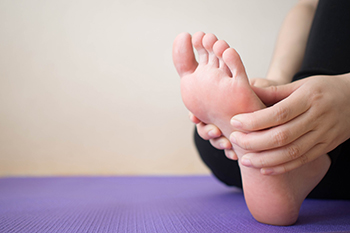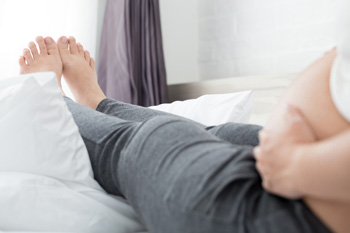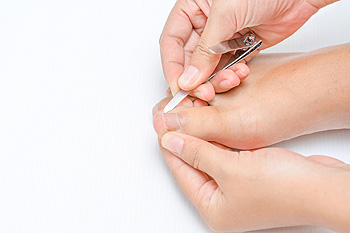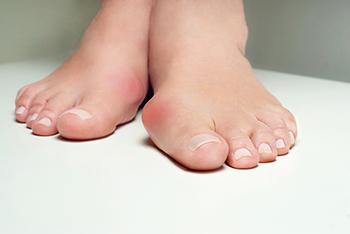
Freehold (732) 294-9393

Freehold (732) 294-9393

Hard lumps that form on the soles of the feet may be indicative of Ledderhose disease. Ledderhose disease is considered to be a rare foot condition that affects the plantar fascia. The plantar fascia is the band of tissue connecting the heels to the toes and may cause pain while walking. The lumps that form are generally benign and typically affect people middle-aged and older. The ankle joints may be uncomfortable, and a tingling sensation may be felt. The exact reason this foot condition develops is unknown, however, people with certain medical ailments may be prone to Ledderhose disease. These can include diabetic patients, people who consume excess alcohol, and those who take specific medications. Wearing custom-made orthotics may help to relieve pressure on the bottom of the feet. If you have pain in the sole of your foot, it is suggested that you consult with a podiatrist who can diagnose Ledderhose disease and offer the correct treatment options.
Some foot conditions may require additional professional care. If you have any concerns, contact Dr. Henry Miller of New Jersey. Our doctor can provide the care you need to keep you pain-free and on your feet.
Rare Foot Conditions
The majority of foot conditions are common and can be treated by a podiatrist. Standard diagnostic procedures are generally used to identify specific conditions and treatment can be rendered. A podiatrist also treats rare foot conditions which can be difficult to diagnose and may need extra attention and care.
There are many rare foot conditions that can affect children. Some of these can include:
Freiberg’s disease - This can be seen as a deterioration and flattening of a metatarsal bone that exists in the ball of the foot. It typically affects pre-teen and teenage girls, but can affect anyone at any age. Symptoms that can accompany this can be swelling, stiffness, and the patient may limp.
Kohler’s disease - This often targets the bone in the arch of the foot and affects younger boys. It can lead to an interruption of the blood supply which ultimately can lead to bone deterioration. The patient may limp or experience tenderness, swelling, and redness.
Maffucci syndrome - This affects the long bones in a child’s foot leading to the development of abnormal bone lesions. They are benign growths and typically develop in early childhood and the bones may be susceptible to breaking.
A podiatrist can properly diagnose and treat all types of rare foot conditions. If your child is affected by any of these symptoms or conditions, please don’t hesitate to call our office so the correct treatment method can begin.
If you have any questions please feel free to contact our office located in Freehold, NJ . We offer the newest diagnostic tools and technology to treat your foot and ankle needs.

When a pregnant woman brings a baby to term, her feet might undergo different and significant changes. For example, during a woman’s pregnancy, she might experience increased swelling in the feet, larger feet, and achy sensations in the feet. One often overlooked symptom of pregnancy is discoloration in the feet. Discoloration is another word for the alteration of color in human skin. Interestingly, discoloration in the skin is a common symptom that some women experience during pregnancy. The feet are certainly no exception to this phenomenon. Specifically, some pregnant women may notice that the soles of their feet have become more red. If you are pregnant or are planning to be, consider contacting a podiatrist today who will help you maintain the health of your feet throughout your pregnancy.
Pregnant women with swollen feet can be treated with a variety of different methods that are readily available. For more information about other cures for swollen feet during pregnancy, consult with Dr. Henry Miller from New Jersey. Our doctor will attend to all of your foot and ankle needs.
What Foot Problems Can Arise During Pregnancy?
One problem that can occur is overpronation, which occurs when the arch of the foot flattens and tends to roll inward. This can cause pain and discomfort in your heels while you’re walking or even just standing up, trying to support your baby.
Another problem is edema, or swelling in the extremities. This often affects the feet during pregnancy but tends to occur in the later stages.
How Can I Keep My Feet Healthy During Pregnancy?
If you have any questions please feel free to contact our office located in Freehold, NJ . We offer the newest diagnostic and treatment technologies for all your foot and ankle needs.

An ingrown toenail is a relatively common condition of the foot in which the side of a toenail essentially grows awkwardly into the skin surrounding the nail. This can cause great irritation and inflammation. Patients who seek help from a podiatrist for relief are in the best hands because this type of doctor can treat the condition. It can also be recommend the patient develop certain habits at home to facilitate the healing process. For example, depending on the specific case, it may be suggested by the podiatrist that you begin soaking the feet. This may be done in any number of ways. Specifically, the podiatrist may advise that you soak your feet in warm, soapy water. Additionally, the podiatrist may suggest to soak the feet in apple cider vinegar combined with warm water. If you are struggling with an ingrown toenail, please contact a podiatrist today for treatment.
Ingrown toenails can become painful if they are not treated properly. For more information about ingrown toenails, contact Dr. Henry Miller of New Jersey. Our doctor can provide the care you need to keep you pain-free and on your feet.
Ingrown Toenails
Ingrown toenails occur when a toenail grows sideways into the bed of the nail, causing pain, swelling, and possibly infection.
Causes
Prevention
Because ingrown toenails are not something found outside of shoe-wearing cultures, going barefoot as often as possible will decrease the likeliness of developing ingrown toenails. Wearing proper fitting shoes and using proper cutting techniques will also help decrease your risk of developing ingrown toenails.
Treatment
Ingrown toenails are a very treatable foot condition. In minor cases, soaking the affected area in salt or antibacterial soaps will not only help with the ingrown nail itself, but also help prevent any infections from occurring. In more severe cases, surgery is an option. In either case, speaking to your podiatrist about this condition will help you get a better understanding of specific treatment options that are right for you.
If you have any questions please feel free to contact our office located in Freehold, NJ . We offer the newest diagnostic and treatment technologies for all your foot and ankle needs.

Bunions are more of a nuisance than they are painful. They can be uncomfortable while wearing shoes, and larger shoes may need to be purchased, which can accommodate the bunion. They are defined as a small bony protrusion that forms on the side of the big toe. It grows gradually, and many patients will eventually seek medical attention to restore normalcy. Swelling and redness can often accompany a bunion, and it may cause the other toes to shift toward each other. A bunion can be caused by genetic reasons, abnormal foot structures, or from frequently wearing shoes that are too tight. Some patients wear a pad on the side of the bunion, which may help to protect it while wearing shoes. If the bunion is severe and causes difficulty in completing daily tasks, surgery may be considered as an option for permanent removal. Bunions are treated by a podiatrist. If you are afflicted with one, please contact this type of doctor who can guide you toward the treatment that is correct for you.
If you are suffering from bunion pain, contact Dr. Henry Miller of New Jersey. Our doctor can provide the care you need to keep you pain-free and on your feet.
What Is a Bunion?
Bunions are painful bony bumps that usually develop on the inside of the foot at the joint of the big toe. As the deformity increases over time, it may become painful to walk and wear shoes. Women are more likely to exacerbate existing bunions since they often wear tight, narrow shoes that shift their toes together. Bunion pain can be relieved by wearing wider shoes with enough room for the toes.
Causes
Symptoms
In order to diagnose your bunion, your podiatrist may ask about your medical history, symptoms, and general health. Your doctor might also order an x-ray to take a closer look at your feet. Nonsurgical treatment options include orthotics, padding, icing, changes in footwear, and medication. If nonsurgical treatments don’t alleviate your bunion pain, surgery may be necessary.
If you have any questions, please feel free to contact our office located in Freehold, NJ . We offer the newest diagnostic and treatment technologies for all your foot care needs.